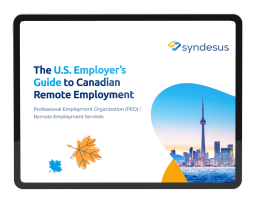It is impossible for US tech companies to ignore what’s happening north of the border. Canadian cities have become some of North America’s fastest-growing tech hubs.
Canada’s transition to tech titan is thanks to world-class universities and engineering programs, a highly-skilled talent pool, and favorable immigration policies.
All of this adds up to a highly skilled Canadian labor force with nearly 900,000 tech talent workers and many major global tech opening offices in Canada.
By leveraging PEO services, US companies of any size can expand into Canada, and it is actually easier than you might think.
Some of the top US tech behemoths, such as Amazon, Salesforce, Netflix, and others are driving the expansion of US tech companies into Canada.
But what about other US tech companies, particularly smaller ones?
The companies who have been paying attention to this trend and who would want to leverage Canadian tech talent?
Or the ones who want to move F-1 OPT or H-1B employees to Canada, but who can’t afford it, or won’t be able to convince their leadership to open an office up North?
There is a way to expand into Canada without having to hire an attorney, establish a legal entity, open up an office, etc.
It’s possible for US companies to expand their hiring strategy in Canada by using a (PEO) Professional Employer Organization and hiring through them.
By leveraging PEO services, US companies of any size can expand into Canada, and it is actually easier than you might think.
This article talks about why and how small, growing, and even large companies from the US can expand into Canada easily, through a PEO, and either use a PEO indefinitely or just as a way to enter Canada and determine if opening up an official office is worth it.
Let’s dive in.
PEOs help small US companies avoid challenges with the H-1B visa process
There are plenty of reasons why a small US company might want to expand into Canada. One reason is to keep a foreign-born skilled employee on staff.
Since 1990, the H-1B visa program has allowed skilled workers to enter the United States on a temporary basis. The H-1B application process is not cheap — filing fees and legal expenses are both thousands of dollars — but the real tragedy is the lottery.
the H-1B visa process is a headache, especially to smaller employers, and often means they can’t hire or retain talented foreign-born tech workers, no matter how important they are to their organization.
As more and more employers register potential employees for the H-1B lottery, since the amount of new H-1B visas are capped at 85,000 per year, the likelihood of winning the lottery and thus being able to even submit an H-1B application continues to decrease.
Additionally, the filing fees may be prohibitive for many small enterprises, especially if you want to expedite the visa application process by using premium processing, which costs an extra $2,500.
The point is that the H-1B visa process is a headache, especially to smaller employers, and often means they can’t hire or retain talented foreign-born tech workers, no matter how important they are to their organization.
In contrast, Canada has proactively been building programs to create hiring opportunities. For example, the Global Talent Stream (GTS) initiative was designed to make it easier for highly skilled technology professionals to immigrate.
The GTS program expedites and simplifies the immigration application process for foreign nationals who have unique abilities or are highly skilled.
The typical timelines for reviewing applications and processing work permits for qualified contributors are 10 business days and 14 business days, respectively.
However, in order to leverage the GTS program, these small employers need to have a Canadian legal entity to sponsor the tech worker’s work visa. And of course, for small companies, this may be prohibitive. That’s where working with a PEO comes in.
A Canadian PEO like Syndesus hires the individual on behalf of the US business as the official employer of record. The PEO pays the employee’s salary, manages their HR compliance, sponsors their GTS work permit, and more. The US employer, of course, still directly manages the employee, is able to give them stock options or any other company perks, and more.
The result?
Hiring or retaining an important tech worker without having to go through the process of opening up an entire legal entity in Canada. It’s a win-win scenario.
Now – what if you’re a growing or mid-size US company?
Scaling in Canada with the help of a PEO
For growing US-based companies, especially those that are raising capital and have an expectation to beef up their tech team, Canada is a great option.
Some advantages of recruiting, retaining, and relocating tech talent in Canada include:
- Operating along the same time zone;
- Ease of flying those employees back to the US for in-person meetings;
- Having some of the fastest-growing tech hubs in North America (indeed, even the world!);
- and has a lot of immigration flexibility to attract talent from around the world.
According to a CBRE report, Canada’s technology workforce is robust and is on the rise.
The quality of tech labor in Canada is built on its educational foundations, which include several of the world’s top universities. And in terms of numbers, fewer international students are enrolling in American institutions and fewer Americans are receiving STEM degrees.
This all implies that there are fewer STEM graduates available to hire in the United States, which is a significant cause to consider Canada as a source of competent labor.
But startups may want to try Canada before committing to opening up an office, and in this case, working with a PEO is a great way to “try before you buy” by relying on the PEO to handle all the legal, administrative, immigration, HR, payroll, and other important but costly aspects of expanding into Canada.
In some cases, these companies decide to eventually take the leap and open up a legal entity in Canada and hire directly after that, though in many instances, working with a PEO is easy enough and they continue that way.
How about large companies that simply don’t have a presence in Canada but have all the resources to open up a Canadian office?
Even large US companies can benefit from expanding into Canada with a PEO
A large company may technically have the resources to open an office and establish a legal entity in Canada, but going through internal bureaucracy, policy changes, etc., may be very slow with a lot of internal politics involved.
To get into Canada…working with a PEO is easier and faster.
Thus, if a team within a large company wants to hire a tech worker in Canada and they currently don’t have an office there, it can be simpler and much faster to partner with a PEO.
Then the company can legally hire a new tech worker in Canada, or move an existing tech worker to Canada, without all the red tape.
It’s a similar “try before you buy” option that mid-size or scaling companies might consider, since both large corporations and growing startups may have the ability to open up a Canadian office down the line.
Getting into Canada working with a PEO is easier and faster.
Syndesus helps US tech companies of all sizes expand to Canada
Syndesus helps US companies that don’t have an office in Canada leverage Canada’s tech talent and favorable immigration laws for tech workers, whether those companies are small US startups or large corporations.
Hiring workers remotely through Syndesus means that the immigration, payroll, and other administrative processes are taken care of for you while you focus on expanding your talented workforce and moving your company forward.
Our turnkey PEO services also enable US tech companies to move their existing tech workers from the US to Canada, or hire new tech workers in Canada, taking care of the visa sponsorship, as well. With Syndesus, Canada can easily become your tech company’s next remote office.
Reach out to us to learn more about how we can help you hire remotely in Canada, or if you’re an experienced tech worker and you’d like to be matched with a Canadian employer, join our Path to Canada database of qualified candidates seeking to move to Canada and get matched!




